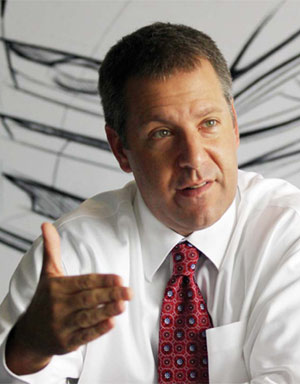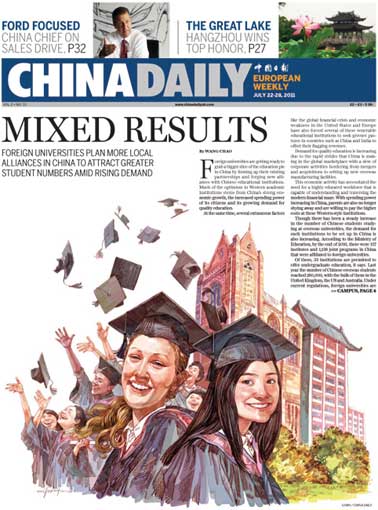More driving a Ford lately
Updated: 2011-07-22 14:09
By Andrew Moody (China Daily)
China chief of US auto giant targets sales dealerships in smaller cities
|
|
Joe Hinrichs, the new chairman and CEO of Ford China, is a man of relentless energy.
The 44-year-old, who admits to a diet fueled by steak and hamburgers, was up at 4:30 am to catch a flight to Beijing from Shanghai, where he is based, but still intended to be working out at his hotel gym after dinner.
"My job, especially with all the travel, requires an immense amount of energy and I find I do this job better if I keep physically fit," he says.
The Midwesterner, who was speaking at the company's office at the Beijing Yintai Centre in Jianguomenwai Street, needs to bring all his life force to his current role.
Ford has fallen behind in China to rival car companies like General Motors, the latter selling more cars in the world's second largest economy than in the United States.
But this is about to change. Ford announced earlier this month that sales in China had reached 274,510 in the first half of this year, a 14 percent increase on the same period last year.
Hinrichs believes Ford can outstrip its US sales in China but is making no forecast. "I think it could happen. There's potential someday. I don't think it's anywhere near happening in the medium term," he says.
He took over his current role from Robert Graziano, who has left to head the company's Australian office, in November last year.
He retains the position of president of the Asia Pacific and African region and is one of the most senior figures in Ford, reporting directly to Alan Mulally, the company's high-profile president and CEO.
| ||||
It is opening dealerships at the rapid rate of two a week, aiming to bring its total to 680 by the middle of the decade. The key target are China's smaller cities.
Ford is also one of the few companies to fully embrace building up manufacturing capacity in the west of China, currently building three factories in Chongqing as part of a $1.6 billion (1.13 billion euros) investment, which also includes another plant in Nanchang in the southeast of the country.
The company does not have a major presence in China today largely due to the company's recent turbulent history.
Its acquisitions in the 1980s and 1990s of high-profile European businesses, including UK car companies Jaguar, Land Rover and Aston Martin as well as Swedish giant Volvo, proved financially draining.
After these businesses were restructured, the company's key North American business started hemorrhaging cash in 2005 and key members of the management team, including Hinrichs, who was then heading the company's operation in Canada , were called back to the company's Detroit headquarters.
"It was 'all hands on deck'. The North American business was really bleeding a lot of red ink, and we really focused everybody's attention on 'we gotta save the ship because there's a big hole in it',"he says.
"This part of the world (China) was relatively small at that point in time, but it was starting to take off, and we were too busy focusing on everything else."
The subsequent mid-decade reorganization has meant Ford fared better in the financial crisis than General Motors - which notoriously had to file for bankruptcy protection - and now has a strong platform from which to attack China.
Hinrichs believes the timing could not be better since millions of people throughout the country are beginning to hit the key $5,000 to $6,000 per capita income level when they make their first car purchase.
"That's been true for the last 100 years even in markets we now consider to be mature what happens to the industry is it takes off when major parts of the country hit that threshold," he says.
Hinrichs, who obtained a magna cum laude first degree in electrical engineering from the University of Dayton in Ohio, began his career with General Motors, whose culture he believes is different to Ford's.
"They are very different. It is not my place to speak about General Motors too much. It's an overused saying but Ford is a family company," he says.
He joined Ford in 2000, managing a plant in Michigan, before being promoted to a whole series of high profile roles, China being the latest.
Hinrichs is a great believer in management ideas and is also a voracious reader of business books.
"My wife tells me, 'Why don't you read something for fun'? But to me business is fun," he says.
One of his key management philosophies is to build on the strengths of individual employees rather than attempt to correct their weaknesses.
"You should focus on leveraging people's strengths and not obsessively spend all your time trying to make people's weaknesses better," he says.
One of the things Hinrichs has to do is untangle Ford's complex ownership structure in China.
As a foreign company, Ford has to operate in a joint venture arrangement with a Chinese company.
In its operation, Chongqing-based Chang'an Automobile Group has a 50-percent stake, Japanese carmaker Mazda (in which Ford is a major shareholder) 15 percent and Ford itself 35 percent.
Ford has submitted a plan to the Chinese government, seeking to allow Ford and Mazda to develop their businesses independently.
"The proposal is still waiting approval. There has been a lot written about it, but we haven't publicly discussed what's in the proposal for all parties' sakes," he says.
Ford is planning to bring 15 new models to the China market in the next five years, which he hopes will appeal to the many potential customers who have yet to buy a car in their lives.
"Roughly two-thirds of the buyers in China are first-time buyers. They've never bought a vehicle before. Most sales in other markets are replacement vehicles. That makes China different," he says.
Hinrichs says the financial crisis, which saw a major slump in car sales in the United States and in Europe, means the center of gravity for the car industry has shifted east.
"The balance of power in the growth of the auto industry is migrating east. Roughly, one out of four vehicles sold in the world last year was in China. I mean, that's unheard of," he says.
Hinrichs says it is important not to ignore recent warnings of an asset bubble in China, which could result in a growth slowdown.
"There's no question. History teaches us a lot of lessons. And one of those lessons is that no one has a straight linear line right up," he says.
But he adds: "By 2020 the numbers show that about a billion people in China could reach the threshold where they could afford to buy a vehicle. So the demand dimensions of the facts aren't going to change."
E-paper

Ringing success
Domestic firms make hay as shopping spree by middle class consumers keeps cash registers ringing in Nanjing
Mixed Results
Crowning achievement
Living happily ever after
Specials

Ciao, Yao
Yao Ming announced his retirement from basketball, staging an emotional end to a glorious career.

Going the distance
British fitness coach comes to terms with tragedy through life changes

Turning up the heat
Traditional Chinese medicine using moxa, or mugwort herb, is once again becoming fashionable

